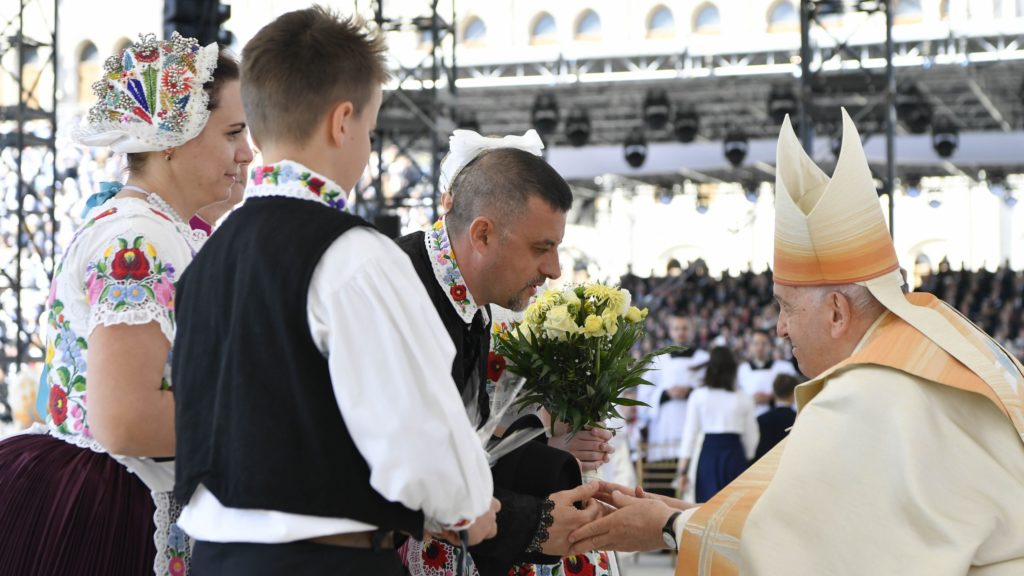Praising the piety and charity of Hungarian Christians and their commitment to supporting traditional family life, Pope Francis said Christ also calls them to open their hearts -- and perhaps their borders -- to others in need.
When it comes to the church or to society, isolationism is not Christian, the pope said in a variety of ways during his visit to Budapest, Hungary, April 28-30.
Because of the 86-year-old pope's mobility issues, the trip was confined to the capital and the official schedule was lighter than usual. But, as is normal for the pope, he used part of his long midday breaks and early evenings for private meetings, including with Russian Orthodox Metropolitan Hilarion of Budapest and Hungary.
Flying back to Rome April 30, the pope confirmed that he and Metropolitan Hilarion had spoken about Russia's war on Ukraine, and he said the Vatican has some special "mission" underway, but he declined to provide details.
The pope also spoke about the war with Prime Minister Viktor Orbán, who, despite being a friend of Russian President Vladimir Putin, has condemned the war. But within the European Union, he has consistently voted against sanctioning Russia and against sending weapons to Ukraine.
Orbán has claimed his position makes him the only European leader siding with Pope Francis, although the pope has insisted Ukraine has a right to defend itself.
In his first speech in Hungary -- to government and civic leaders and diplomats serving in Budapest -- the pope encouraged the leaders to foster greater European unity rather than going their own way.
The "passionate quest of a politics of community and the strengthening of multilateral relations seems a wistful memory from a distant past," he said April 28 in his speech at the former Carmelite monastery that now houses Orbán's office.
"More and more," the pope said, "enthusiasm for building a peaceful and stable community of nations seems to be cooling, as zones of influence are marked out, differences accentuated, nationalism is on the rise and ever harsher judgments and language are used in confronting others."
Ukraine is one of Hungary's eastern neighbors and Hungarians have assisted some 2.5 million Ukrainians who have crossed the border since Russia's war on Ukraine began in February 2022. About 35,000 of the Ukrainian refugees have remained in Hungary.
Pope Francis repeatedly praised Hungarians for opening their country and their hearts to the Ukrainians, but in several speeches and at his Mass April 30 in Budapest's Kossuth Lajos Square, he urged them to be open to everyone in need.
"How sad and painful it is to see closed doors," he said in his homily. He cited "the closed doors of our selfishness with regard to others; the closed doors of our individualism amid a society of growing isolation; the closed doors of our indifference toward the underprivileged and those who suffer; the doors we close toward those who are foreign or unlike us, toward migrants or the poor."
Orbán and President Katalin Novák, who have promoted the migration restrictions, were among the estimated 50,000 people attending the Mass in the square in front of the Hungarian Parliament building.
The pope also preached openness April 28 during a meeting with Hungary's bishops, priests, religious, seminarians and catechists.
He called Hungarian Catholics to embrace "prophetic welcome" or "prophetic receptivity," which, he said, "is about learning how to recognize the signs of God in the world around us, including places and situations that, while not explicitly Christian, challenge us and call for a response."
Christians grow in "prophetic receptivity," he said, by "bringing the Lord's consolation to situations of pain and poverty in our world, being close to persecuted Christians, to migrants seeking hospitality, to people of other ethnic groups and to anyone in need."
Pope Francis met with more than 10,000 Hungarian young people in a sports arena April 29 and listened to four of them share how they have overcome obstacles and grown in their faith.
One of them, Tódor Levcsenkó, a 17-year-old student in Miskolc, Hungary, and the son of an Eastern Catholic priest from the Eparchy of Mukachevo in Western Ukraine, told his peers that their sense of mission and purpose can be "numbed by the fact that we live in safety and peace," but only a few miles away, across the border, "war and suffering are the order of the day."
"May we have the courage to defend our faith and take up our call to be peacemakers," he said.
Pope Francis echoed his call, telling the young people, "This is the real challenge: to take control of our lives in order to help our world live in peace. Each one of us should ask the uncomfortable question: What am I doing for others, for the church, for society? Do I think only about myself?"

